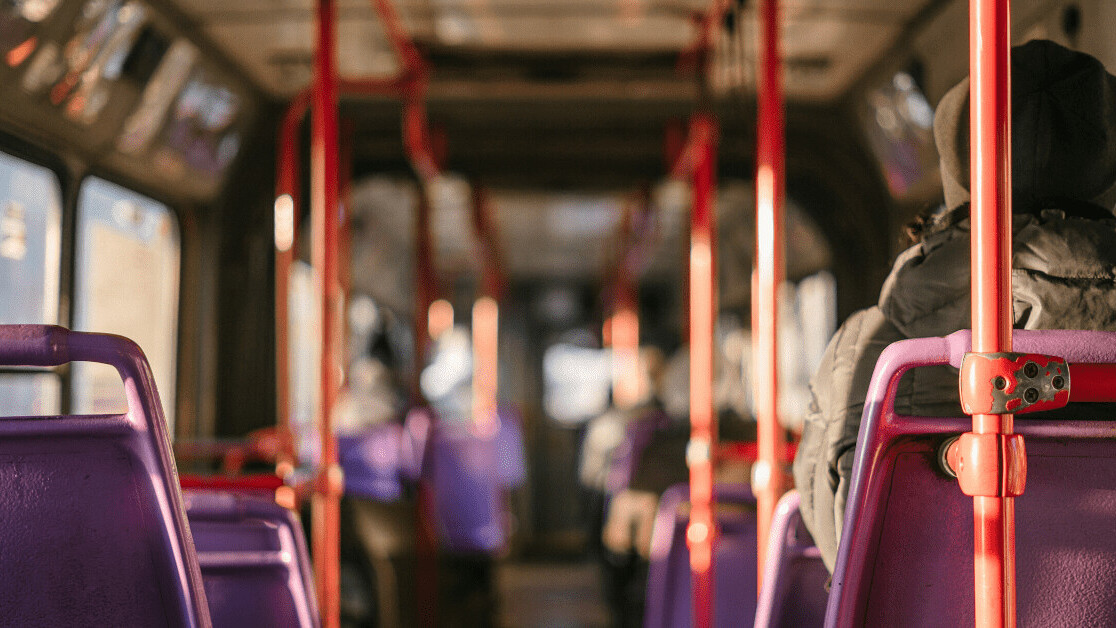This article was originally published by Sarah Wray on Cities Today, the leading news platform on urban mobility and innovation, reaching an international audience of city leaders. For the latest updates follow Cities Today on Twitter, Facebook, LinkedIn, Instagram, and YouTube, or sign up for Cities Today News.
UK-based regional bus operator Warrington’s Own Buses has installed air-cleaning devices from technology company AirLabs in driver cabins across its entire operational fleet as part of a COVID-19 safety drive.
The ‘AirBubbl’ filters more than 95 percent of airborne viruses and contaminated particulate matter and floods the vehicle with over 30,000 liters of clean air every hour. AirLabs, which was founded in 2014, is also developing related technology – AiroSafe – which it says will create a “personal air space” for every passenger seat.
Stephen Stringer, Head of Engineering at Warrington’s Own Buses, which is owned by Warrington Council, said: “The priority for us is to protect the health and safety of our employees, who provide an essential service, and of course for our customers, the people of Warrington.
“By installing the AirBubbl devices we’re ensuring that we can reduce the risk of exposure for our staff, who have done a fantastic job in serving Warrington during this crisis.”
AirLabs is also installing AirBubbl devices in 100 patient transport vehicles operated in London by healthcare transport provider The HATS Group. HATS originally planned to install the air filtration systems to protect passengers and crews from air pollution but ramped up the deployment as vehicles were repurposed during the pandemic to help transport coronavirus patients.
Following the receipt of a US$100,000 grant from Barclays and Unreasonable Impact, AirLabs is now working to bring its AiroSafe technology to market for use in the passenger cabins of public transport services, including buses, coaches and trains. The company aims to install the first passenger protection units with partners by October this year, having worked closely with organizations in the rail and bus sector to develop the technology. The grants were awarded to ten organizations to support entrepreneurial solutions that are addressing immediate and long-term challenges resulting from the pandemic.
The announcements come amid emerging evidence that coronavirus could be spread not only by droplets emitted when people cough or sneeze but also by tiny particles suspended in the air. AirLabs says its solutions, in conjunction with the use of face masks, can support increasing the number of passengers allowed on public transport and reassure people about using mass transit again — both challenges raised by transport leaders in Europe and the US on recent Cities Today Institute digital roundtables.
Clearing the indoor air
A spokesperson for AirLabs told Cities Today more about how the systems work: “Our AirBubbl and AiroSafe products both use AirLabs’ air filtration technology, which is able to filter more than 95 percent of airborne viruses and contaminated particulate matter. The difference between the two products is in the airflow design.
“The AirBubbl is designed to work in enclosed or semi-enclosed spaces and uses multi-direction air flow jets to flood the area with clean air and protect the driver. AiroSafe has been developed specifically to work in a large multi-occupancy compartment. In this case the devices need to work together to ensure that as clean air is delivered it is not moving potentially contaminated air into the breathing space of another passenger. To achieve this, multiple AiroSafe devices are installed across the passenger compartment which draw away the air breathed by the passengers, providing clean air as a secondary function.
“Each seat will be fitted with a device to ensure that the air that a passenger is breathing out doesn’t reach anyone else, thereby creating a personal air space for every seat.”
The spokesperson also said they expect transport providers would keep the technology in place beyond COVID-19.
“Air quality can be extremely poor in urban environments and although the focus is on coronavirus at present, air pollution is likely to remain a priority issue around the world for many years to come,” they said. “Furthermore, unfortunately the coronavirus is unlikely to be the last virus to hit us.”
AirLabs has published a whitepaper on reducing exposure to airborne viruses using air filtration systems.
Barcelona recently announced it is trialling a ‘smart ventilation’ system on the city’s metro network to maximize fresh air, regulate temperature and humidity and help stop the spread of coronavirus.
Get the TNW newsletter
Get the most important tech news in your inbox each week.





